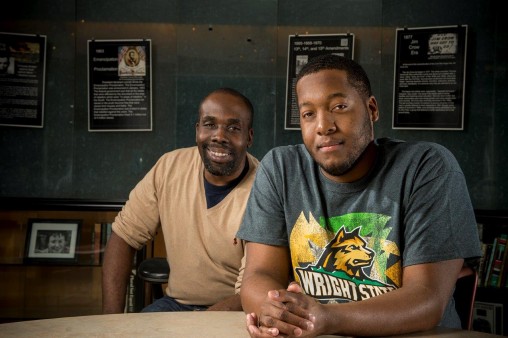
Andrew-Bryce Hudson, left, program director, and mentor Alfred Harper are part of a group of Wright State faculty and staff helping first-year African-American students in the Bolinga Black Cultural Resources Center’s Ujima mentoring program.
A customized mentoring program that pairs Wright State faculty and staff with first-year African-American students to help them through what can be a daunting maze of new programs and procedures is hitting on all cylinders.
The Ujima program, operated out of the Bolinga Black Cultural Resources Center, is resulting in the retention of students, said Andrew-Bryce Hudson, program director.
“Some first-year students struggle in learning how to function successfully in higher education,” Hudson said. “It can be intimidating. Having this program takes some of the edge off of that. It gives the students support and directs them to resources.”
Ujima, a Swahili word meaning collective work and responsibility, is in its second year. There are currently 35 students in the program and 25 faculty and staff mentors.
“What we’re finding is the students don’t know what they don’t know,” said Hudson. “So as situations happen, we address each one individually with the help of the mentors.”
Hudson researched mentoring programs at other universities and combined the best elements of each. A unique aspect of Wright State’s program is using faculty and staff as mentors, who are of all different races, instead of student peers.
“Faculty and staff have a better grasp of the ins and outs of college than peer mentors in the traditional model,” he said.
The program provides a roadmap to students looking for the right classes, financial aid and other services.
“They often talk about how they sometimes find themselves in a situation in which they can’t afford textbooks,” said Hudson. “So we show them how they can reserve and borrow textbooks through OhioLINK, the Ohio Library and Information Network.”
Hudson said the mentors and program officials also help students with personal, non-academic issues. For example, one student who often had to leave campus for family obligations was taught time-management skills.
Alfred Harper, a graduate student majoring in student affairs in higher education, helps develop monthly programs for the students, such as a panel discussion on successful study habits and how to prepare for final exams. He also checks in on the students regularly to find out how things are going with their classes.
“The mentors are there to establish a relationship with the mentees and really allow the mentees to feel comfortable speaking to them about whatever type of problem they have, whether it be with school or personal,” he said. “Then the mentor knows what’s going on so we can all be there for the student and respond accordingly.”
Harper said it is sometimes difficult to get the students to reveal their problems.
“You have to prod them a bit and reassure them that it is OK to talk about issues so we can help them,” he said.
The students who are mentored are actually employed by the program, working up to 10 hours a week. They serve as administrative assistants, do research for the mentors, attend conferences and perform other duties.
“I think the students have become more responsible,” Hudson said. “Being in the program helps them understand they have a commitment to furthering their education and in doing so have to get things prepared. It has definitely helped keep students here. The data shows that the program has an impact.”
Wright State is engaged in a $150 million fundraising campaign that promises to further elevate the school’s prominence by expanding scholarships, attracting more top-flight faculty and supporting construction of state-of-the-art facilities. Led by Academy Award-winning actor Tom Hanks and Amanda Wright Lane, great grandniece of university namesakes Wilbur and Orville Wright, the campaign has raised more than $110 million so far.
Hudson says the mentoring program and the retention tools it has created demonstrate why Wright State is a special place.
“It also shows the university’s commitment to diversity and inclusion,” he said.

 ‘Only in New York,’ born at Wright State
‘Only in New York,’ born at Wright State  Wright State president, Horizon League leaders welcome new commissioner
Wright State president, Horizon League leaders welcome new commissioner  Wright State celebrates homecoming with week-long block party
Wright State celebrates homecoming with week-long block party  Wright State baseball to take on Dayton Flyers at Day Air Ballpark April 15
Wright State baseball to take on Dayton Flyers at Day Air Ballpark April 15  Wright State joins selective U.S. Space Command Academic Engagement Enterprise
Wright State joins selective U.S. Space Command Academic Engagement Enterprise 